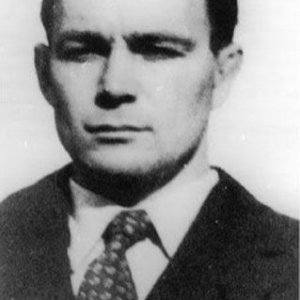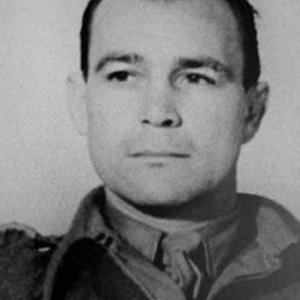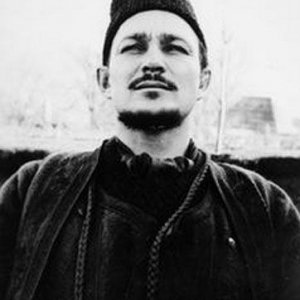- SURNAME
Hudson
- FORENAME
Duane Tyrrell
- UNIT
SOE Yugoslavia
- RANK
Lieutenant (A/Major) + T/Colonel
- NUMBER
195421
- AWARD
Distinguished Service Order, Officer of the Order of the British Empire
- PLACE
Yugoslavia 1941 (DSO) Poland 1944 (OBE)
- ADDITIONAL INFORMATION
parent unit General List
born 11.08.1910, Bromley, Kent, UK
aka Marko and Bill
from South Africa
mining engineer
Lieutenant Colonel
SOE Yugoslavia 1941
SOE Poland 1944 (Op.Freston)
died 01.11.1995, Durban, South Africa
D. T. Hudson - secret agent and mining engineer - had a career of almost unexampled endurance during the last World War.
"Bill" Hudson was born in Kent in 1910 of South African parents who sent him to St Andrew's College, Grahamstown, and then to the School of Mines in South Kensington. There he distinguished himself as an athlete, particularly as a boxer; he used to say that he preferred fists to pistols if it came to self-defence at close quarters.
He went to manage an antimony mine in the Yugoslav mountains in 1935 and prospected in the Balkans. Next year he was married to a white Russian ballerina but could not persuade her to come and live near his mine; she preferred the bright lights and they agreed to divorce. He never remarried but remained attractive to women, many of whom delighted in his company; he is supposed to have been (like Merlin Minshall) one of Ian Fleming's models for James Bond.
In the autumn of 1939 he was recruited into Section D (supposedly for "Destruction") of the British Secret Service, and in its service at Zagreb his clandestine adventures began. One of his colleagues was murdered, and Croat extremists of pro-German sympathies planted a bomb beneath his office which nearly killed him. He already spoke fluent Serbo-Croat, and recruited a network of saboteurs to tackle Axis shipping in Dalmatian ports; he sank an Italian ship himself in February 1941, by which time Section D had been absorbed into the Special Operations Executive.
SOE extracted him from Yugoslavia, but sent him back there in September 1941 by submarine. Julian Amery saw ashore Hudson and three Yugoslavs, with two wireless sets, one of which soon burnt out. Hudson's orders were to find out what was happening; and, if he could, to make all the resisters he found work together.
He met a body of guerrillas who called themselves partisans under a leader who called himself Tito; they wore red stars in their caps and he could soon see that their leadership was Communist. He met another party of guerrillas who called themselves Chetniks and came under Colonel Drazha Mihailovic of the pre-war Serb General Staff. He was the only British agent who met both Mihailovic and Tito; but he was unable to make them work together. On the contrary, he realised that they were about to embark on a Yugoslav civil war.
Mihailovic confiscated his wireless set, and he had an absolutely miserable winter, living on little beyond stinging nettles and slivovitz. Serb peasants no better fed than himself looked after him and confirmed his lifelong admiration for them as a race. All round him villages were being burned by the Germans, who executed 100 Yugoslavs for every man they lost: so ghastly a rate of reprisal that it put Mihailovic off active operations for a while, though it did not deter Tito.
Hudson was twice captured by bandits, but escaped. Locally he was codenamed Marko in memory of a Serb monarch who had held out against all odds in the Middle Ages. What happened to such reports as he managed to send out to SOE in Cairo remains unclear. SOE sent in Col S.W. Bailey, who outranked him, in 1942; he stayed on as political adviser in turn to Bailey and to Brigadier C.D. Armstrong, until early 1944 when he was at last withdrawn by Dakota for a rest.
His rest was brief. He was flown to London in May to brief Churchill and Eden on what he thought was happening on the spot. By this time, on Churchill's orders, SOE had dropped its support for Mihailovic and was backing Tito, because Tito seemed to be killing more Germans and was tarred less black with the brush of collaboration with the enemy.
He was promoted Colonel and briefed for a reconnaissance mission into southern Poland called "Freston"; which the Russians forbade but which parachuted in all the same (at the fourth attempt) north of Krakow late in 1944. Within a month, the party was overrun by the Red Army and promptly arrested by the NKVD. They were held in atrocious conditions until the day after the Yalta conference was over and Poland's fate was sealed.
After the war Hudson volunteered to appear as a witness for Mihailovic, who was put on trial in Belgrade and then executed, but was told he would be prosecuted as a war criminal if he set foot in Tito's Yugoslavia. He returned to South Africa and to mining, this time for tungsten. He sold out a tungsten mine he had discovered for so large a sum that he could spend the rest of his long life as a gentleman of leisure with a flat over Prunier's in St James's and another in Durban. He was troubled by depression, feeling that he ought to be able to do more to help his beloved Serbs; yet always remained a strong, gentle, lovable character.
M. R. D. Foot
Duane Tyrrel Hudson, secret agent and mining engineer: born Bromley, Kent 11 August 1910; DSO 1942; OBE 1945; married 1936 Ada Proskurnikova (marriage dissolved); died Durban 1 November 1995.
Source : Independent.co.uk
CITATION:
Distinguished Service Order : On 15 Sep 41 he was landed on an enemy occupied coast and at great personal risk penetrated inland, through an enemy infested country, and established communication with his H.Q. He followed this up by penetrating further inland in face of enemy and succeeded in reaching the Guerilla H.Q. in the BALKANS, where, again, he established communication with his H.Q.
At Guerilla H.Q. he found the patriot elements engaged in a fratricidal struggle and succeeded in effecting a reconciliation which resulted in all forces facing the common enemy.
The value of his work, which is still continuing, and his courage in meeting the many dangers and difficulties involved cannot be praised too highly.
Officer of the Order of the British Empire : In December 1944 Col. HUDSON was parachuted into Germany-occupied POLAND in command of the first party of British observers to be attached to the Underground Forces of that country. This operation took place ater the fall of WARSAW for the second time, when the Polish Forces were in a state of disintegration and when German control of the country was at its height. Shortly after landing, his party was attacked by a considerable force of infantry and armour specially detached to capture them. Col HUDON's party and a small force of the Polish Underground troops, amounting to about platoon strength, beat off this enemy atack, which was of battalion strenght, and escaped to the woods. In spite of the fact that all ther heavy equipment was lost, they established W/T communication with base in the U.K., and provided firt hand information on conditions in that part of EUROPE, which proved to be of considerbale value.
Col. HUDSON successully evaded all further German endeavours to capture the party and on completion of his task, when POLAND was liberated by the Red Army, he returned to this country.
In view of the distinguished services which this officer has rendered, it is recommended the he be appointed an Officer in the Order of the British Empire (Military Division)
At Guerilla H.Q. he found the patriot elements engaged in a fratricidal struggle and succeeded in effecting a reconciliation which resulted in all forces facing the common enemy.
The value of his work, which is still continuing, and his courage in meeting the many dangers and difficulties involved cannot be praised too highly.
Officer of the Order of the British Empire : In December 1944 Col. HUDSON was parachuted into Germany-occupied POLAND in command of the first party of British observers to be attached to the Underground Forces of that country. This operation took place ater the fall of WARSAW for the second time, when the Polish Forces were in a state of disintegration and when German control of the country was at its height. Shortly after landing, his party was attacked by a considerable force of infantry and armour specially detached to capture them. Col HUDON's party and a small force of the Polish Underground troops, amounting to about platoon strength, beat off this enemy atack, which was of battalion strenght, and escaped to the woods. In spite of the fact that all ther heavy equipment was lost, they established W/T communication with base in the U.K., and provided firt hand information on conditions in that part of EUROPE, which proved to be of considerbale value.
Col. HUDSON successully evaded all further German endeavours to capture the party and on completion of his task, when POLAND was liberated by the Red Army, he returned to this country.
In view of the distinguished services which this officer has rendered, it is recommended the he be appointed an Officer in the Order of the British Empire (Military Division)
WEB LINKS:
https://en.wikipedia.org/wiki/Bill_Hudson_(British_Army_officer)NATIONAL ARCHIVES:
https://discovery.nationalarchives.gov.uk/details/r/C8995906 (SOE File)https://discovery.nationalarchives.gov.uk/details/r/D7369535 (DSO)
https://discovery.nationalarchives.gov.uk/details/r/D7396763 (OBE)
Last edited by a moderator:






